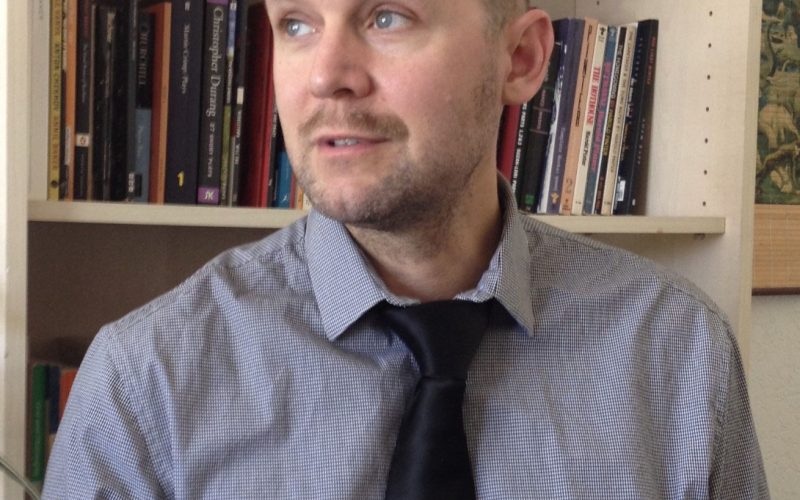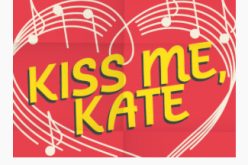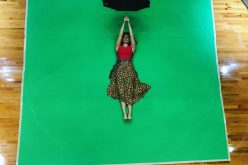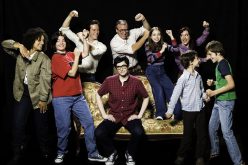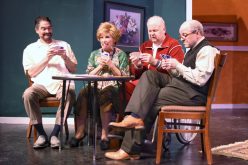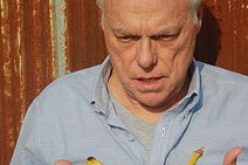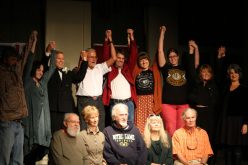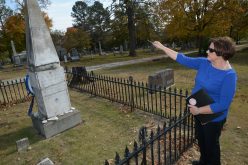Screenwriter finds new passion at UA
LARA JO HIGHTOWER
lhightower@nwadg.com
For the past three years, the University of Arkansas has produced the ArkType New Play Festival at the end of each school year — a way to celebrate the work of the playwrights studying in the UA Department of Theatre’s Master of Fine Arts program. Because covid-19 prevented this year’s festival, The Free Weekly has been chatting this summer with the program’s current students. We’re finishing up the series with playwright Brenden Beseth.
Beseth began his career writing screenplays — he’s the screenwriter of “Luckytown,” which starred Kirsten Dunst and James Caan — but when he took a class at Los Angeles’ Actors Studio in playwriting, he says he fell in love.
“I started writing plays about six years ago and was in The Actors Studio in LA as a playwright, and I started falling in love with plays,” says Beseth of the switch in his professional focus. “I think the one thing that drew me to it is the ability, the freedom, to delve more into characters and themes — whereas, in movies, you’re kind of handcuffed. Most of the time, you have to stick to a story, stick to a tight paradigm about how things are supposed to be done. There are page markers that you have to hit on — on page 16, a certain thing has to happen; on page 30, the end of the second act has to happen. There aren’t all of these rules in playwriting.”
Beseth’s play “Bookshop” was featured at the 2018 William Inge Festival in Kansas, and his play “A Vegas Kind of Love” was a finalist for Rogue Machine’s Premier Award for best new play at the 2017 Hollywood Fringe Festival.
Can you tell us a little bit about your bio as a playwright thus far?
I’ve only been writing plays for a few years. I’ve been a screenwriter most of my life and turned to playwriting more recently. When I lived in Los Angeles I was a member of the Actors Studio West. That’s really where my love of playwriting began. This was a few years ago now, and back then Martin Landau was still alive and would have sessions with the actors every Friday morning. I would go to these and would take notes, and I learned more about writing plays from his notes to the actors than I think I have anywhere else. Playwrights (all writers, I think) have to get into their characters just like actors do. Using some of the same techniques that actors use helps me with that. Landau was a brilliant guy and a great teacher.
What are you working on right now? Can you tell us a little bit about it?
I’m doing a pretty huge rewrite of this play called “Thrift Store Junkie” that I’ve been working on for a while now. The UA is going to produce it over zoom in the fall. I’m also working on a screenplay and two graphic novels. I usually work on several things at once, until one thing takes over. “Thrift Store” definitely took all my time for a while, but now I’m really getting into writing graphic novels.
Who are your inspirations among writers of all mediums?
I’m inspired by Russian writers a lot – Chekhov, Tolstoy, Dostoyevsky. My favorite books are “War and Peace,” “The Brothers Karamazov” and Ulysses. So I like Joyce, too. But I’m inspired by good writing in any medium. Even comic books! Bad writing I can’t even read, though. It’s a little depressing, since there are a lot of great stories I’m never going to experience because sentences and sounds mean so much to me. Bob Dylan said he could never date a woman with a harsh-sounding voice. Well, I can’t read a book that doesn’t sound right to me.
How has being in the UA program benefited your work?
I’m so grateful to be at the UA. It’s an amazing program packed with some of the nicest, most talented people I’ve ever been around. It’s a great environment for learning, and I think I’ve made huge strides already in my time there — with even more to learn! Having material read as soon as I’ve written it is one of the best learning experiences. It’s definitely not how I like to write, but it’s a skill to develop for the real world where people want stuff as soon as possible. I basically have to trick my brain into doing it. The last thing you want to be thinking about is other people reading your work as you’re writing it. So I have to constantly tell myself — “this is just for me, this is just for me.” The worst enemy to creativity is fear. I like to think of it like dreaming — if you were constantly critiquing your dreams as you had them, would you ever have interesting dreams? No! For me writing is like dreaming, and so I have to shut down the part of my brain that’s the critic.
Do you think the current global pandemic will have a lasting effect on the art of theater and, if so, what effect do you predict it will have?
I don’t think it will have that much effect, especially five years from now. Next year and the year after, yes. But I’m hoping some things do change for the better. I’d like to see a theater scene that takes more chances, handles more difficult subjects, is more diverse, one that’s able to fail more; fail all the time, if possible. Theater is not nearly as bad as movies are as far as being completely consumed by the economics of the affair, but it’s getting there. Just like writers have to be willing to fail in order to write great groundbreaking work, theaters have to be willing to fail, too, for the same reason. If the writers are taking chances, but the theaters can’t or won’t, then it’s a darkness.
Do you have any advice for budding playwrights?
I’d say you really have to love it, if you’re going to do it. And I’d say if in your life you’ve always turned to writing something when you’re the most stressed or the most upset about something, you’re probably a writer — whether you like it or not. But I’m sure there’s exceptions to that. It’s one of the greatest things in the world, but it isn’t easy. I mean, the life isn’t easy. The writing should be easy, come naturally, in my opinion. But the big advice — being a playwright is harder than hitting a 100 mile an hour fastball. In baseball, a hitter is considered great who makes out seven out of 10 times. In playwriting, a playwright is considered great who writes one decent play. There’s a lot of failure involved, a lot of bored-looking audiences, which in my opinion is one of the worst sights in all of life. So that being said, trust yourself over everyone else. If you’re going to fail, fail as yourself and not as someone else or as someone that others want you to be. And if you do that, then you’re not failing at all.

